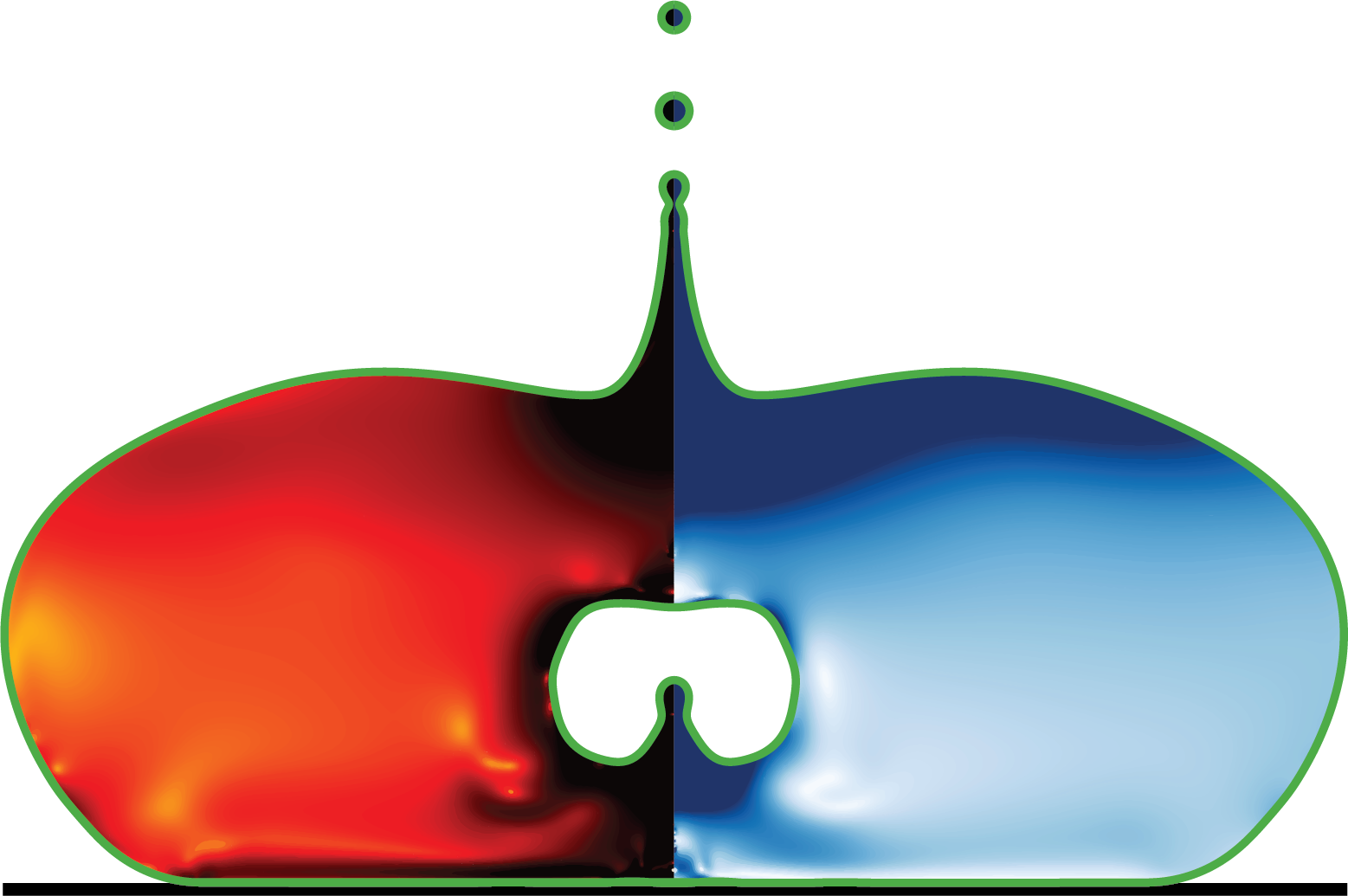Jumping Bubbles
A high-performance computational framework for studying bubble coalescence and jumping phenomena on substrates using Basilisk C. This repository provides a complete suite of simulation tools, post-processing utilities, and validated test cases for investigating two-phase free-surface flows with adaptive mesh refinement.
Key Features
Advanced Two-Phase Flow Modeling
- Volume of Fluid (VOF) method for sharp interface tracking
- Conservative momentum advection coupled with VOF field
- Accurate surface tension implementation using the Brackbill method
- Reduced gravity approach for specific physical scenarios. This keeps the system of equations well-balanced.
High-Performance Computing
- Adaptive octree mesh refinement based on multiple
criteria:
- Interface fraction gradients
- Local curvature
- Velocity field variations
- Parallel computation support:
- OpenMP for shared-memory systems
- MPI for distributed computing (HPC clusters)
Comprehensive Analysis Tools
- Real-time monitoring of physical quantities
- Advanced post-processing capabilities:
- 2D/3D visualization scripts
- Interface reconstruction
- Energy and momentum analysis
- Trajectory tracking
Project Structure
- basilisk/src/
- # Core Basilisk C framework
- navier-stokes/
- # Flow solvers
- centered.h - # Main centered NS solver
- conserving.h - # Conservative form solver
- two-phase*.h - # Two-phase flow implementations
- vof.h - # Volume of Fluid method
- curvature.h - # Interface property calculations
- tension.h - # Surface tension (Brackbill)
- integral.h - # Surface tension integral form
- viscosity.h - # Implicit viscous stress solver
- axi.h - # Axisymmetric computations
- navier-stokes/
- # Flow solvers
- src-local/ - # Project-specific modifications
- postProcess/ - #
Analysis and visualization
- Video2DSlice.py - # 2D slice animations
- Video3D.py - # 3D visualization
- Visualization3D.ipynb - # Interactive 3D notebook
- getFacets3D.c - # Interface extraction
- simulationCases/ - #
Validation cases
- JumpingBubbles.c - # Standard test case
- JumpingBubbles-hydrophilic.c - # Hydrophilic substrate
- runCases*.sh - # Execution scripts
Installation
Prerequisites
- GCC compiler (version 7.0+)
- MPI implementation (OpenMPI or MPICH)
- Python 3.7+ (for post-processing)
- Required Python packages: numpy, matplotlib, scipy
- Xcode Command Line Tools (for MacOS users)
Setting up Basilisk
Clone this repository:
git clone https://github.com/comphy-lab/JumpingBubbles.git cd JumpingBubblesRun the installation script:
./reset_install_requirements.shThis script will:
- Install Basilisk if not present (use
--hardflag for fresh installation) - Configure the environment automatically
- Create
.project_configwith required paths - Verify the installation
- Install Basilisk if not present (use
Verify installation:
source .project_config qcc --version
Usage
Running Simulations
Local Development (OpenMP)
# Compile
qcc -O2 -Wall -disable-dimensions -fopenmp -I$(PWD)/src-local testCases/JumpingBubbles.c -o JumpingBubbles -lm
# Run with 4 threads
export OMP_NUM_THREADS=4
./JumpingBubblesHPC Deployment (MPI)
Generate initial condition locally first
Compile with MPI support:
CC99='mpicc -std=c99' qcc -Wall -O2 -D_MPI=1 -disable-dimensions \ -I$(PWD)/src-local testCases/JumpingBubbles.c -o JumpingBubbles -lmUse provided Slurm script:
testCases/runSnellius.sbatch
Post-Processing
Visualization
2D Slice Videos:
python postProcess/Video2DSlice.py <simulation_directory>3D Visualization:
python postProcess/Video3D.py <simulation_directory>Interactive Analysis:
- Open
postProcess/Visualization3D.ipynbin Jupyter
- Open
Data Analysis
- Use
getFacets3D.cto extract interface geometry - Various slice extraction tools available in
postProcess/
Contributing
We welcome contributions to improve Jumping Bubbles! Here’s how you can help:
Reporting Issues
Click on the “Issues” tab above or use these quick links: - Report a Bug - Request a Feature - Ask a Question - Open a Blank Issue
Making Changes
- Fork the repository
- Create a feature branch
(
git checkout -b feature/AmazingFeature) - Make your changes
- Run tests and ensure they pass
- Update documentation if needed
- Commit your changes
(
git commit -m 'Add some AmazingFeature') - Push to the branch
(
git push origin feature/AmazingFeature) - Open a Pull Request
Please ensure your PR: - Clearly describes the changes - Includes any relevant tests - Updates documentation as needed - References any related issues
License
This project is licensed under the GNU General Public License v3.0 - see the LICENSE file for details.
Citation
If you use this code in your research, please cite:
@software{jumping_bubbles_2024,
author = {Sanjay, V. and Yang, R.},
title = {Jumping Bubbles: A Computational Framework for Studying Bubble Coalescence},
year = {2025},
publisher = {Zenodo},
version = {v2.0},
doi = {10.5281/zenodo.14602623},
url = {https://comphy-lab.org/JumpingBubbles/}
}Acknowledgments
- Based on the Basilisk C framework.
Generated Documentation
Root Directory
postProcess
- postProcess/Video2DSlice.py
- postProcess/Video3D.py
- postProcess/Visulization3D.ipynb
- postProcess/getCells_bottomPlate.c
- postProcess/getDataXSlice.c
- postProcess/getDataZSlice.c
- postProcess/getFacets3D.c
simulationCases
- simulationCases/DataFile/retrieveDataFile.sh
- simulationCases/JumpingBubbles-hydrophilic.c
- simulationCases/JumpingBubbles.c
- simulationCases/Makefile
- simulationCases/runCasesOpenMP.sh
- simulationCases/runCasesOpenMPI.sh








